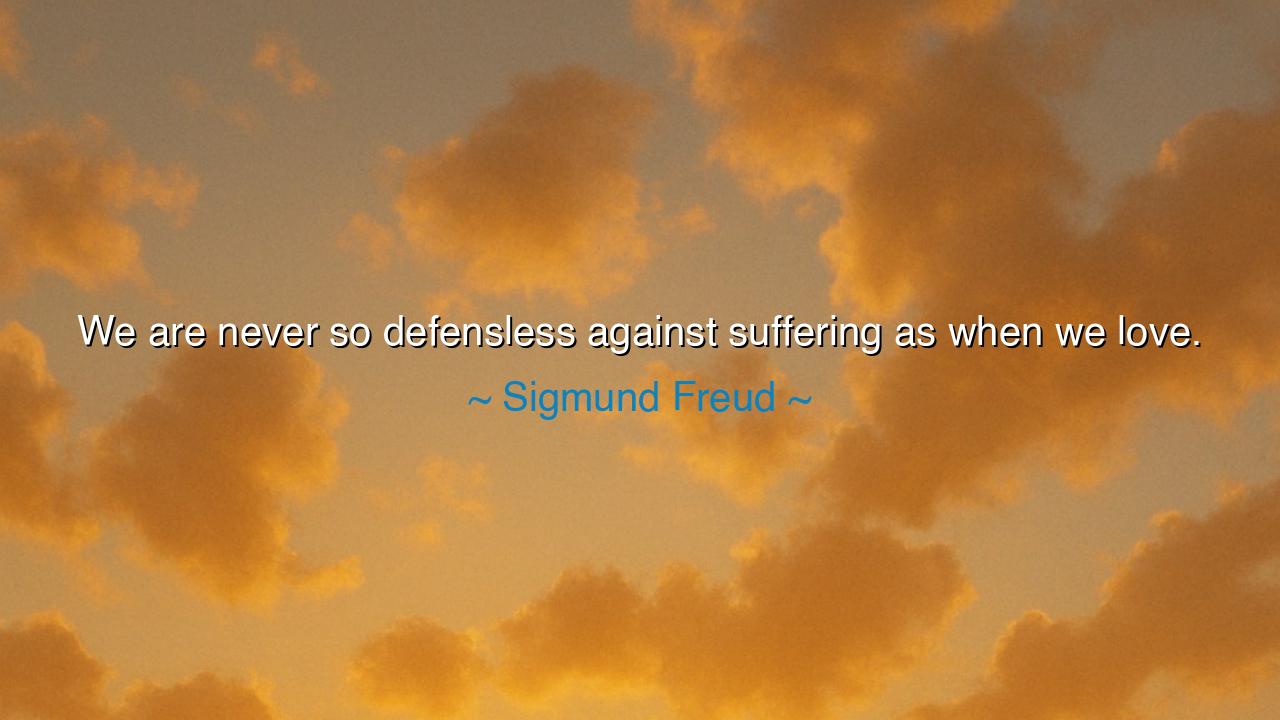
We are never so defensless against suffering as when we love.






"We are never so defenseless against suffering as when we love." These words, spoken by the great thinker Sigmund Freud, offer a profound insight into the vulnerability that accompanies love. To love deeply is to open oneself to the possibility of pain, of loss, of heartache. Love, by its very nature, demands a surrender of the self—an offering of our most cherished emotions and affections. In loving, we place our hearts in the hands of another, leaving us exposed and vulnerable. When we love, we invest ourselves fully, and in doing so, we are never more susceptible to the suffering that can arise from the very thing we cherish most.
In the teachings of the ancients, love was seen as both a divine gift and a dangerous force. The Greeks, for instance, viewed Eros, the god of love, as a powerful deity who could lift the soul to heights of ecstasy and cast it into the depths of despair. Plato understood love as a force that transcended the physical realm, capable of binding the spiritual and the mortal. Yet, with this exalted position came the inevitable risk: love was a force that could overwhelm the soul, bringing not only joy and bliss but also heartbreak and anguish. Freud’s words resonate with this ancient wisdom: love, in its purest form, is a surrender that leaves us defenseless against the pain that often follows.
The tale of Orpheus and Eurydice, one of the great myths of ancient Greece, embodies this paradox. Orpheus, a musician of divine skill, fell deeply in love with Eurydice, but when she was tragically taken from him, his world was shattered. He ventured into the underworld to bring her back, but the very love he held for her—his most profound desire—became the source of his downfall. When he was instructed not to look back at her until they reached the surface, the overwhelming love he felt for Eurydice made him defenseless against the temptation to see her. His inability to protect himself from the pain of separation led to his loss, and Eurydice was forever gone. This myth encapsulates Freud’s insight: love, while elevating us, also leaves us vulnerable to the most profound suffering.
Similarly, the tragic love story of Antony and Cleopatra exemplifies how love can make one defenseless to the slings of fate. Their love was fierce, intoxicating, and all-consuming, but it also led to their mutual demise. Despite their power and influence, they were powerless in the face of betrayal, political pressure, and ultimately, the end of their reign. Antony’s love for Cleopatra, which was both personal and political, rendered him vulnerable to the forces around him. His very affection for her made him susceptible to the wounds of loss and heartache, and when Cleopatra died, his world collapsed. Their love, in all its grandeur, exposed them to a suffering so great that it consumed both of their lives. In this, we see that love’s power is not only in its ability to heal and uplift but in its capacity to make us defenseless against the forces that seek to tear us apart.
Freud’s insight also speaks to the inner conflict we feel when we love. To love is to expose our hearts to another, to risk vulnerability, to lay bare our deepest emotions. In doing so, we give another person the power to hurt us. This power can be used to heal and nurture, but it can also be wielded to wound and destroy. The fear of loss, rejection, or betrayal looms over us when we love, and in this state of uncertainty, we are particularly vulnerable. Yet, it is precisely this vulnerability that makes love so powerful. It requires the courage to open ourselves to the world, to trust that the love we give will be met with affection and care, but also understanding that we may lose it at any moment. Love, in this sense, is both the greatest strength and the greatest weakness—a force that gives us purpose and meaning, while also leaving us susceptible to the harshness of life.
The lesson Freud imparts is that love is not a shield against suffering; rather, it is the key to understanding the depth of human emotion. Love opens the door to the greatest joys, but also to the deepest sorrows. To love is to embrace the full range of human experience—the beauty and the pain, the ecstasy and the anguish. It teaches us that to be truly human is to be vulnerable, to risk the loss of what we cherish most. Yet, in this vulnerability, we also find the richness of life—the profound connections that shape our existence and make us truly alive.
In your own life, reflect on the love you give and receive. Do you protect yourself from suffering by withholding love, or do you embrace the fullness of the human experience, knowing that love may bring both joy and pain? Love is not without risk, but it is in that very risk that we find the beauty of life. Love fully, and in doing so, you open yourself to the greatest transformations. Embrace the vulnerability that love brings, and understand that through love, we experience not only the deepest connections but also the deepest truths of our existence. Love is the fire that illuminates the path, even as it burns away our defenses. Live with love, and let it guide you through both the light and the shadows of life.






AAdministratorAdministrator
Welcome, honored guests. Please leave a comment, we will respond soon